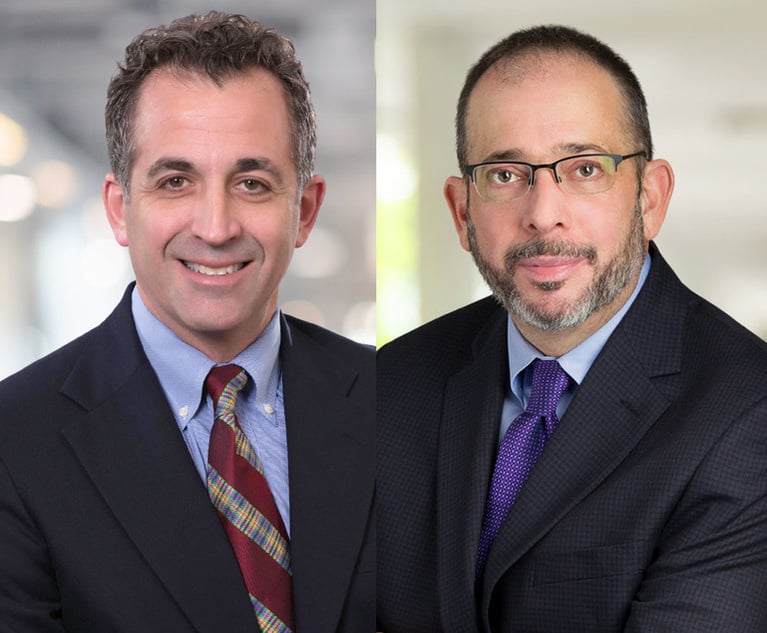Lawyers Battle Over Special Prosecutor Role in Gambling Cases
A former state attorney general claims an Atlanta lawyer who works as a special assistant district attorney leverages the threat of criminal prosecution against vulnerable business owners to lay claim to their assets.
October 31, 2017 at 03:52 PM
6 minute read
 David Cooke Jr. (left) and Christopher Anulewicz
David Cooke Jr. (left) and Christopher Anulewicz
A former Georgia attorney general claims a pay deal between an Atlanta attorney and a Middle Georgia prosecutor violates state law and appellate rulings by giving them a financial stake in bringing criminal prosecutions and civil forfeiture cases.
Former AG Mike Bowers and law partner Christopher Anulewicz have filed a motion to disqualify Atlanta attorney Michael Lambros and David Cooke Jr., district attorney for the Macon Judicial Circuit, in a criminal case against a Peach County couple. The defendants are Ronnie Bartlett, 73, and his 76-year-old wife, Lee—owners of a now-defunct restaurant, Captain Jack's Crab Shack.
Bowers and Anulewicz, both of Balch & Bingham, have also sought to disqualify Lambros in an unrelated civil racketeering case against Rana Mujudiddi and Faith Business Inc. Mujudiddi is the owner of a DeKalb County convenience store.
Lambros, who defeated a disqualification challenge last year, declined to comment, referring the Daily Report to Cooke's office. Cooke's spokeswoman said the allegations in the disqualification motions “are false and will be proven false.”
“We look forward to having our day in court,” Cooke's statement said.
Both cases involve the operation of coin-operated game machines where winners allegedly received cash prizes, a misdemeanor offense under state gambling laws.
Both disqualification motions are before Macon Judicial Circuit Superior Court Judge David Mincey III.
The Bartletts' Peach County restaurant was shut down in 2015 after Lambros, acting as a special assistant district attorney (ADA), and the Macon DA seized nine coin-operated video games at the restaurant, according to a federal lawsuit the Bartletts filed against Cooke and Lambros last year.
A temporary receiver took control of the Bartletts' bank accounts and assets, and Lambros filed a civil racketeering suit against the couple stemming from their coin-operated games. He dismissed the suit after the Bartletts were forced into bankruptcy.
The Bartletts were not charged with any crime until 17 months after their restaurant was raided—and two months after they sued Cooke and Lambros. Charges include racketeering, commercial gambling, possession of a gambling device or operating a gambling house, and failing to turn over sales tax revenues to the state.
Once the Bartletts were indicted, Cooke and Lambros sought and received a stay of the federal civil proceedings until the criminal charges are resolved.
Bowers and Anulewicz, representing the Bartletts, have asked Mincey to dismiss the indictment and have claimed in federal filings that the criminal charges were retaliation for the couple's civil suit.
The disqualification motion in the Bartletts' criminal case claims the charges are part of “a wide-reaching pattern and practice” Lambros has employed for at least 17 years “of seizing and retaining assets of small businesses” with coin-operated machines by filing civil racketeering suits and, in some cases, criminal charges.
“Lambros leverages the threat of criminal prosecution against vulnerable business owners, many of whom are immigrants to this country, to extort settlements from them, the proceeds of which Lambros and Cooke retain for their personal financial and political benefit,” the motion says.
To disqualify Lambros and Cooke from prosecuting their clients, Bowers and Anulewicz contend that Lambros is collecting contingency fees based on the total assets forfeited—a practice barred by state statute, the State Bar of Georgia's professional conduct rules and rulings of the state Court of Appeals and state Supreme Court.
Bowers and Anulewicz examined Lambros' escrow account records through state public records requests, because he is paid with public money as a special ADA. They say that Lambros has no contract with Cooke's office and that Lambros' escrow transactions associated with the forfeitures show that Lambros was paid from asset seizures only in cases where assets actually were forfeited. In cases that were dismissed, Lambros did not collect a fee, they said.
Lambros has addressed the motion to disqualify him as a prosecutor in the Faith Business case, asserting in a one-paragraph response that there is no contingency fee contract that violates state law. Neither Lambros nor Cooke have filed a response to the Bartlett disqualification motion.
At a September court hearing in the Faith Business case, Lambros acknowledged that he negotiated settlements involving asset forfeitures on the district attorney's behalf. But he insisted he is paid an hourly rate as a special ADA because, “It's against the law to do a contingency.” He told the judge he withheld those hourly billings when he responded to Anulewicz's open records request. Mincey has ordered Lambros to turn those hourly billings over to him for an in camera review before he rules on the Faith Business disqualification motion, according to a hearing transcript.
Lambros has defeated a motion to disqualify him before. In Clayton County last year, where Lambros has served as a special ADA for DA Tracy Lawson, Clayton County Superior Court Judge Matthew Simmons found no evidence of a contingency fee arrangement after Lambros produced a contract with the Clayton DA stating he would be paid regardless of whether assets were ultimately forfeited.
Anulewicz told the Daily Report that his review of open records associated with Lambros' asset forfeitures for the Macon DA shows that Lambros has no contract with Cooke and that Lambros' draw of legal fees are directly tied to asset forfeitures. “The payments to the special ADA [Lambros] are clearly unconstitutional and in violation of the law. … He should be disqualified from doing this any further,” Anulewicz said.
Anulewicz and Bowers also contended in the Bartlett disqualification motion that Lambros has used his authority as a special ADA to his financial benefit.
In one 17-month period from April 2016 to August 2017 in Cooke's circuit alone, Lambros was paid $710,000 after he secured more than $3.3 million in asset seizures—far more, the motion said, than if he had billed at an hourly rate as a special ADA. Lambros holds similar appointments as special ADA in other circuits across the state.
In the same 17-month period during which Lambros earned $710,000, the special ADA channeled more than $2.6 million to Cooke's coffers, the motion said.
Citing donations Cooke has made to local civic groups from those forfeited assets, Anulewicz said, “It is very clear that the DA's office in Macon has profited substantially from its continued forefeiture efforts and that these monies have been expended not for his office but on politically beneficial issues.”
“It really bothers me as a lawyer in this state to see these types of actions being taken that are clearly for monetary purposes,” Anulewicz said. “It's not the purpose of being a DA. It's not acting in the best interest of the public when you are lining your office's pocket or your own pocket, and then that interest becomes predominant. That's why you can't do this.”
This content has been archived. It is available through our partners, LexisNexis® and Bloomberg Law.
To view this content, please continue to their sites.
Not a Lexis Subscriber?
Subscribe Now
Not a Bloomberg Law Subscriber?
Subscribe Now
NOT FOR REPRINT
© 2025 ALM Global, LLC, All Rights Reserved. Request academic re-use from www.copyright.com. All other uses, submit a request to [email protected]. For more information visit Asset & Logo Licensing.
You Might Like
View All
Billing Rate Increases Boost Atlanta and Southeast Law Firms' Financial Growth
6 minute read
Bradley Arant Sees Revenues Rise and PEP Fall Amid 12% Equity Partner Expansion
5 minute read
As Associate Pay Raises Divide the Market, Several Law Firms Match, Others Hold Off
5 minute read
Phila.-Based Weber Gallagher Opens Florida Outpost With Fowler White Partner
4 minute readTrending Stories
- 1Inside Track: AI Is Sure to Fray Big Law's Devotion to Billable Hour
- 2Evidence Explained: Prevailing Attorney Outlines Successful Defense in Inmate Death Case
- 3The Week in Data Jan. 24: A Look at Legal Industry Trends by the Numbers
- 4The Use of Psychologists as Coaches/Trial Consultants
- 5Could This Be the Era of Client-Centricity?
Who Got The Work
J. Brugh Lower of Gibbons has entered an appearance for industrial equipment supplier Devco Corporation in a pending trademark infringement lawsuit. The suit, accusing the defendant of selling knock-off Graco products, was filed Dec. 18 in New Jersey District Court by Rivkin Radler on behalf of Graco Inc. and Graco Minnesota. The case, assigned to U.S. District Judge Zahid N. Quraishi, is 3:24-cv-11294, Graco Inc. et al v. Devco Corporation.
Who Got The Work
Rebecca Maller-Stein and Kent A. Yalowitz of Arnold & Porter Kaye Scholer have entered their appearances for Hanaco Venture Capital and its executives, Lior Prosor and David Frankel, in a pending securities lawsuit. The action, filed on Dec. 24 in New York Southern District Court by Zell, Aron & Co. on behalf of Goldeneye Advisors, accuses the defendants of negligently and fraudulently managing the plaintiff's $1 million investment. The case, assigned to U.S. District Judge Vernon S. Broderick, is 1:24-cv-09918, Goldeneye Advisors, LLC v. Hanaco Venture Capital, Ltd. et al.
Who Got The Work
Attorneys from A&O Shearman has stepped in as defense counsel for Toronto-Dominion Bank and other defendants in a pending securities class action. The suit, filed Dec. 11 in New York Southern District Court by Bleichmar Fonti & Auld, accuses the defendants of concealing the bank's 'pervasive' deficiencies in regards to its compliance with the Bank Secrecy Act and the quality of its anti-money laundering controls. The case, assigned to U.S. District Judge Arun Subramanian, is 1:24-cv-09445, Gonzalez v. The Toronto-Dominion Bank et al.
Who Got The Work
Crown Castle International, a Pennsylvania company providing shared communications infrastructure, has turned to Luke D. Wolf of Gordon Rees Scully Mansukhani to fend off a pending breach-of-contract lawsuit. The court action, filed Nov. 25 in Michigan Eastern District Court by Hooper Hathaway PC on behalf of The Town Residences LLC, accuses Crown Castle of failing to transfer approximately $30,000 in utility payments from T-Mobile in breach of a roof-top lease and assignment agreement. The case, assigned to U.S. District Judge Susan K. Declercq, is 2:24-cv-13131, The Town Residences LLC v. T-Mobile US, Inc. et al.
Who Got The Work
Wilfred P. Coronato and Daniel M. Schwartz of McCarter & English have stepped in as defense counsel to Electrolux Home Products Inc. in a pending product liability lawsuit. The court action, filed Nov. 26 in New York Eastern District Court by Poulos Lopiccolo PC and Nagel Rice LLP on behalf of David Stern, alleges that the defendant's refrigerators’ drawers and shelving repeatedly break and fall apart within months after purchase. The case, assigned to U.S. District Judge Joan M. Azrack, is 2:24-cv-08204, Stern v. Electrolux Home Products, Inc.
Featured Firms
Law Offices of Gary Martin Hays & Associates, P.C.
(470) 294-1674
Law Offices of Mark E. Salomone
(857) 444-6468
Smith & Hassler
(713) 739-1250






